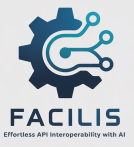
Facilis  Works
Works
 Works
Works


 0
0 1
1
What's new in this version
Youtube video https://youtu.be/bTv2GUdlHJo
Facilis - Effortless API Interoperability with AI

Facilis is an AI-powered solution designed to streamline API integration by extracting structured specifications from natural language descriptions. Now powered by CrewAI, Facilis ensures a more efficient and modular approach to handling API documentation and interoperability.
How to pronounce Facilis: [ˈfäkɪlʲɪs̠]
🚀 Motivation
Managing API integrations can be complex and error-prone. Facilis simplifies this process by leveraging AI to extract and validate API details, ensuring compliance with OpenAPI standards and facilitating seamless interoperability.
🛠️ How It Works
Facilis processes user-provided API descriptions, extracting key details such as endpoints, HTTP methods, parameters, authentication, and more. It then structures the extracted information into OpenAPI-compliant JSON and exports it to InterSystems IRIS for interoperability. The workflow consists of multiple AI agents, orchestrated by CrewAI, handling:
- Extraction: Identifies and structures API specifications from natural language.
- Interaction: Requests missing details from the user.
- Validation: Ensures API compliance and consistency.
- Transformation: Converts structured API details into OpenAPI JSON.
- Review: Verifies OpenAPI compliance before finalization.
- Integration: Connects with Facilis API on InterSystems IRIS. Handles deployment configurations, creating the production, Business Services, Business Operations, and everything else
📋 Prerequisites
- Python 3.10+
- Docker & Docker Compose
- An API key from your preferred LLM provider (OpenAI, Azure OpenAI, Google Gemini, or Claude)
🛠️ Installation
1️⃣ Clone the Repository
git clone https://github.com/musketeers-br/dc-facilis
cd dc-facilis
2️⃣ Set Up Environment Variables
Facilis requires two .env files with the same variables:
- One in the root directory
- One inside
python/facilis/
Create .env files based on the provided samples
cp env_sample .env
cp python/facilis/env_sample python/facilis/.env
Edit .env and python/facilis/.env with your settings
# AI Engine selection (choose one: openai, azureopenai, googleGemini, claude, ollama) AI_ENGINE=openaiLLM Model Name
LLM_MODEL_NAME=gpt-4o-mini
API Key for the selected AI provider
OPENAI_API_KEY=your-api-key-here
Why Two .env Files?
Facilis organizes its AI agents into two groups: Planners and Generators. You can assign different LLM models to each group. For example, you may want to use Claude Sonnet for planning and GPT-4o for generating. This setup allows greater flexibility in balancing speed, accuracy, and cost.
3️⃣ Run with Docker Compose
# Build the container docker-compose build --no-cache --progress=plainStart the application
docker-compose up -d
Stop and remove containers
docker-compose down --rmi all
💡 How to Use
1. Describe Your APIs
Simply describe your API endpoints in natural language. For example:
I want to retrieve all users from api.example.com/users using GET method and also create a new user POST api.example.com/users
This will be automatically converted into proper API specifications for:
- GET /users - Retrieve all users
- POST /users - Create a new user
2. Provide Production Details
- Enter your production name
- Specify the namespace
Facilis will then create an OpenAPI documentation from your natural language prompt. If any information is missing, the agents will interact with you to gather the necessary details.
Once the OpenAPI documentation is finalized, it will be sent to InterSystems IRIS via a REST service. Subsequently, other agents will convert this OpenAPI documentation into a functional Interoperability configuration.
Important Considerations:
- This part of the process may encounter timeout errors due to the lengthy time required to generate the interoperability components.
- The agents may occasionally “hallucinate,” generating Business Operations and Business Services that deviate from the specified requirements.
- The generated files are stored in the /output/ folder, which is intended for import into InterSystems IRIS. However, import and compilation errors may occur.
- This process relies on LLMs, which are not yet fully accurate. Manual review and adjustments are often necessary.
Disclaimer: This project, Facilis, is a proof of concept and an experiment in AI automation. It is intended for demonstration and exploration purposes. Use with caution and be aware of potential limitations and inaccuracies.
🚧 Limitations
-
Accuracy of extracted API details depends on the quality of user input.
-
LLM-based processing may introduce minor inconsistencies requiring manual review.
-
Currently optimized for OpenAPI 3.0.
-
Facilis has 16 AI agents and a complex processing pipeline. Due to this complexity, the entire process may take a considerable amount of time to execute.
-
Disclaimer: Unfortunately, the app could hallucinate, as it depends on user input and the LLM model used. In our tests, GPT-4o and Claude Sonnet provided the best results, but they also hallucinate occasionally. In some cases, we needed to run the same prompt multiple times to achieve a satisfactory result. We are continuously working to improve accuracy and reliability.
🎖️ Credits
Facilis is developed with ❤️ by the Musketeers Team



